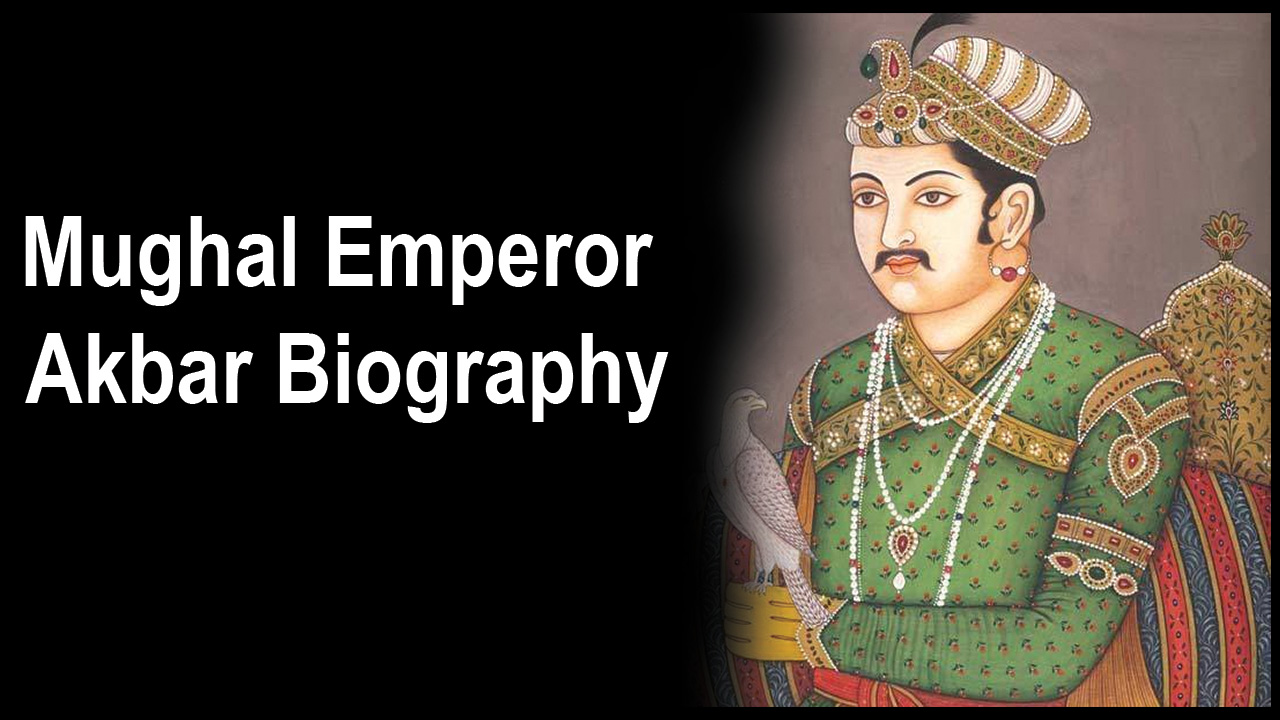About Mughal Emperor Akbar
Akbar is considered the greatest Mughal emperor of India. Akbar’s full name is Abu al-Fatah Jalal al-Din Muhammad Akbar. He was born on October 15, 1542 in Umerkot, now in Sindh province, Pakistan and died on October 25, 1605 in Agra, India. He expanded Mughal power over most of the Indian subcontinent and ruled from 1556 to 1605. He was always considered the people’s king because he listened to his people. To maintain unity in his empire, various programs were adopted by Akbar that helped win the loyalty of the non-Muslim population in his territory. He ensured that the central administration of his kingdom was reformed and strengthened.
Akbar also focused on centralizing his financial system and reorganizing the tax-collection process. Akbar believed in Islam as his religion but he had utmost respect for other people and their religions. He showed keen interest in understanding other religions and asked various religious scholars from religions like Hinduism, Zoroastrianism, Buddhism, Christianity and Islam to engage in religious discussions before him. Akbar was illiterate, and he always encouraged arts and respected those who could teach him new things, and that is why his court was considered the center of cultures as he was the home of various scholars, poets, artists, etc. Used to encourage people to show their art. Art in front of him.
Personal Details:
- Akbar’s full name: Abu al-Fatah Jalal al-Din Muhammad Akbar.
- Date of Birth: October 15, 1542
- Death date: October 25, 1605
- Cause of death- dysentery, an infection in the intestines that causes bloody diarrhea
- Age (at the time of death)- 63
Akbar history
Akbar the Great is also known as Abu al-Fatih Jalal al-Din Muhammad. Akbar was a descendant of Turks, Iranians and Mughals. Genghis Khan and Tamerlane are considered the ancestors of Akbar. Humayun was the father of Akbar who ascended the throne of Delhi as the ruler of the Mughal territories in the Indian subcontinent. He came to power at the age of 22 and as a result he was very inexperienced.
In December 1530, Humayun succeeded his father as ruler of the Mughal territories in the Indian subcontinent. When Humayun came to power at the age of 22, he was an inexperienced ruler. Sher Shah Suri defeated Humayun and captured many Mughal territories. Humayun went to Persia and took political asylum for about 10 years and returned after 15 years to reclaim the lost Mughal territories.
Humayun ascended the throne in 1555 but had no authority over his kingdom. Humayun further expanded his Mughal territories and then he met with an accident and died in 1556, leaving a significant legacy to his son Akbar. At the age of 13, Akbar was made the governor of the Punjab region. When Humayun died in 1556, he had just established his authority as an emperor, which led many other rulers to see this as a possibility to take over the Mughal dynasty. As a result of which many governors of the Mughal Empire had to lose many of their important positions. Delhi was also captured by Hemu, a Hindu minister, who claimed the throne for himself.
But under the guidance of Bairam Khan, who was the young emperor’s regent, on November 5, 1556, the Mughal army defeated Hemu in the Second Battle of Panipat and recaptured Delhi, thus ensuring Akbar’s succession.
Akbar Wife:
Akbar had six wives, his first wife was Princess Ruqaiya Sultan Begum, who was also his cousin. His second wife was Bibi Kheira, daughter of Abdullah Khan Mughal. His third wife was Salima Sultan Begum, daughter of Noor-ud-din Muhammad Mirza. His another wife was Bhakkari Begum, daughter of Sultan Mahmud of Bhakkar. Akbar married Jodhabai, daughter of Raja Bharmal, the Rajput ruler of Ajmer. She is also known as Mariam-uz-Zamani. Qasima Banu Begum, daughter of Arab Shah, was also Akar’s wife.
Akbar son:
Akbar had five sons from different wives. His first two sons were Hasan and Hussain and their mother was Bibi Aram Bakhsh. Both of them died at a young age due to unknown reasons. Akbar’s other sons were Murad Mirza, Daniyal Mirza and Jahangir. Akbar’s favorite son was Daniel Mirza because he, like his father, had a keen interest in poetry. Of the three sons, Prince Salim or Jahangir became the fourth emperor of the Mughal dynasty after Akbar.
Akbar Religious Policy
Mughal Emperor Akbar was known for his religious policies and liberal views towards it. He adopted a policy which helped in maintaining mutual understanding among people of different religions. In the policy started by Akbar, every religion was treated with respect and equality. He always tried to maintain peace and harmony among people of different religions. He also founded a new religion called ‘Deen-e-Ilahi’ which had all the common points of all the religions. The main steps taken for religious harmony during the time of Akbar was to treat everyone regardless of their faith. Akbar saw the injustice done to Hindus by his predecessors and he solved all of them like abolishing taxes on Hindus, employing Hindus in high positions, cooperating with Hindu families and most importantly worshiping all To allow freedom.
Because of Akbar’s religious policies, people of different religions trusted him and actually accepted him as their king. The impact of religious policies was huge and allowed the empire to grow stronger. Cultural unity emerged and an atmosphere of goodwill developed among people of different religions. Akbar was also credited as the national king by all the people.
Akbar Reign
After Bayram Khan retired in 1560, Akbar began ruling on his own. Akbar first attacked Malwa and captured it in 1561. In 1562, Raja Bihari Mal of Ajmer offered his daughter in marriage to Akbar and Akbar accepted it and this was considered a sign of complete surrender. Akbar followed the feudal system like other Rajput chieftains. They were allowed to take over the territories of their ancestors on the condition that they would accept Akbar as their emperor.
Akbar strengthened his alliance with the Rajputs by paying tribute when needed by supplying his soldiers to fight their wars. Akbar showed no mercy to those who refused to accept him as their emperor and accept his supremacy. While fighting Mewar in 1568, Akbar captured the fort of Chittor and killed its inhabitants. The fall of Chittor led to many Rajput rulers surrendering against Akbar’s supremacy in 1570 and accepting him as their emperor.
Akbar captured Gujarat in 1573. It was an area with many ports that was very successful in trading with Western Asia. After conquering Gujarat, Akbar set his sights on Bengal, a city with a network of rivers. The Afghan rulers of Bengal decided to surrender to Akbar in 1575.
Towards the end of his reign, Akbar conquered Kashmir in 1586, Sindh in 1591, and Afghanistan in 1595. After completely conquering the north, the Mughals then set their sights on the south. In 1601, Khandesh, Ahmednagar and part of Berar were added to Akbar’s empire. During his entire reign, Akbar captured two-thirds of the Indian subcontinent.
Conclusion
Akbar was the third emperor of the Mughal dynasty and also the most successful. By the end of his reign, he had conquered two-thirds of the Indian subcontinent, including Afghanistan. A notable feature of how he ruled his kingdom was that he treated everyone equally, no matter what religion they belonged to. Everyone was allowed to practice their religion without any fear. Discrimination against Hindus was reduced by abolishing taxes on pilgrims. He gave equal employment opportunities to Hindus in higher positions.
Akbar was very successful as a ruler because every person of any religion in his kingdom trusted him and the way he ran his kingdom. Akbar was successful in bringing cultural unity among the people and that is why everyone gave him the title of national king.



